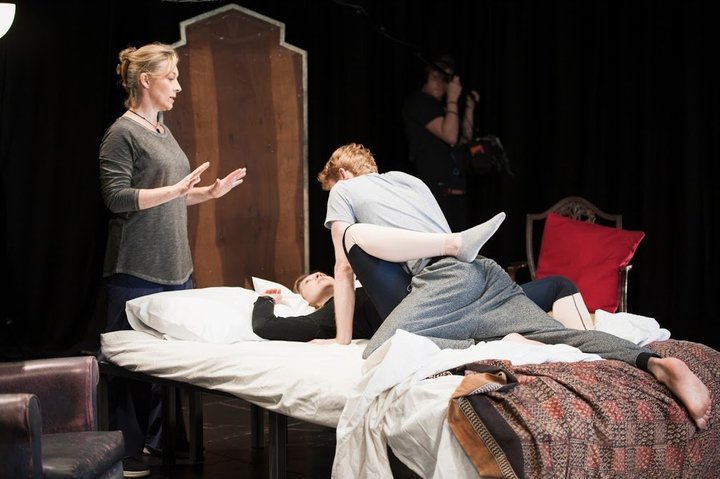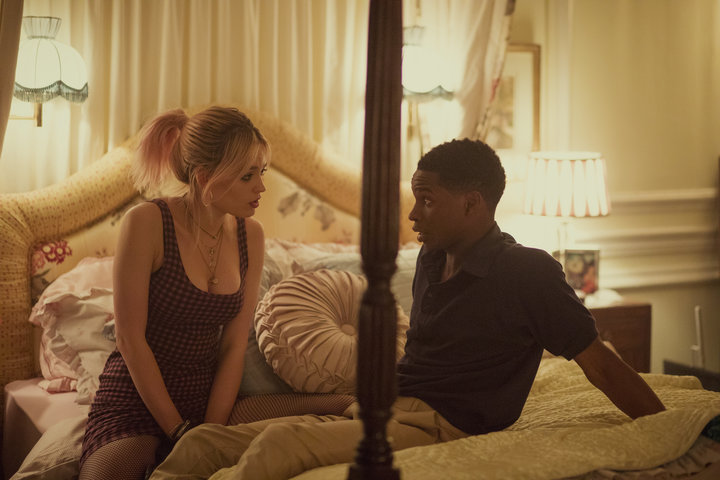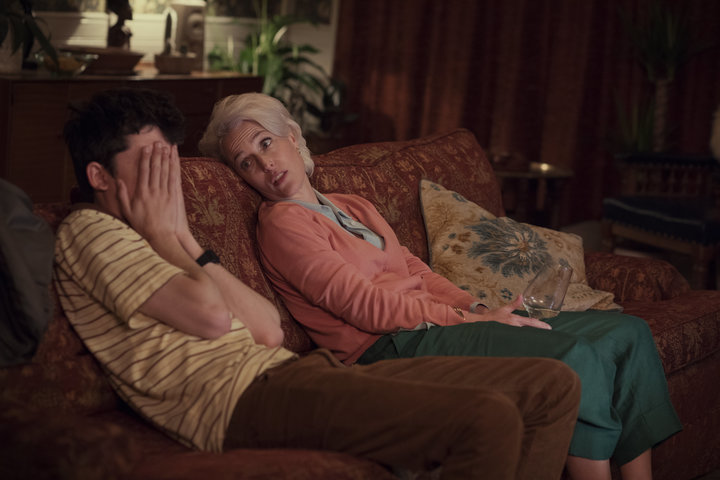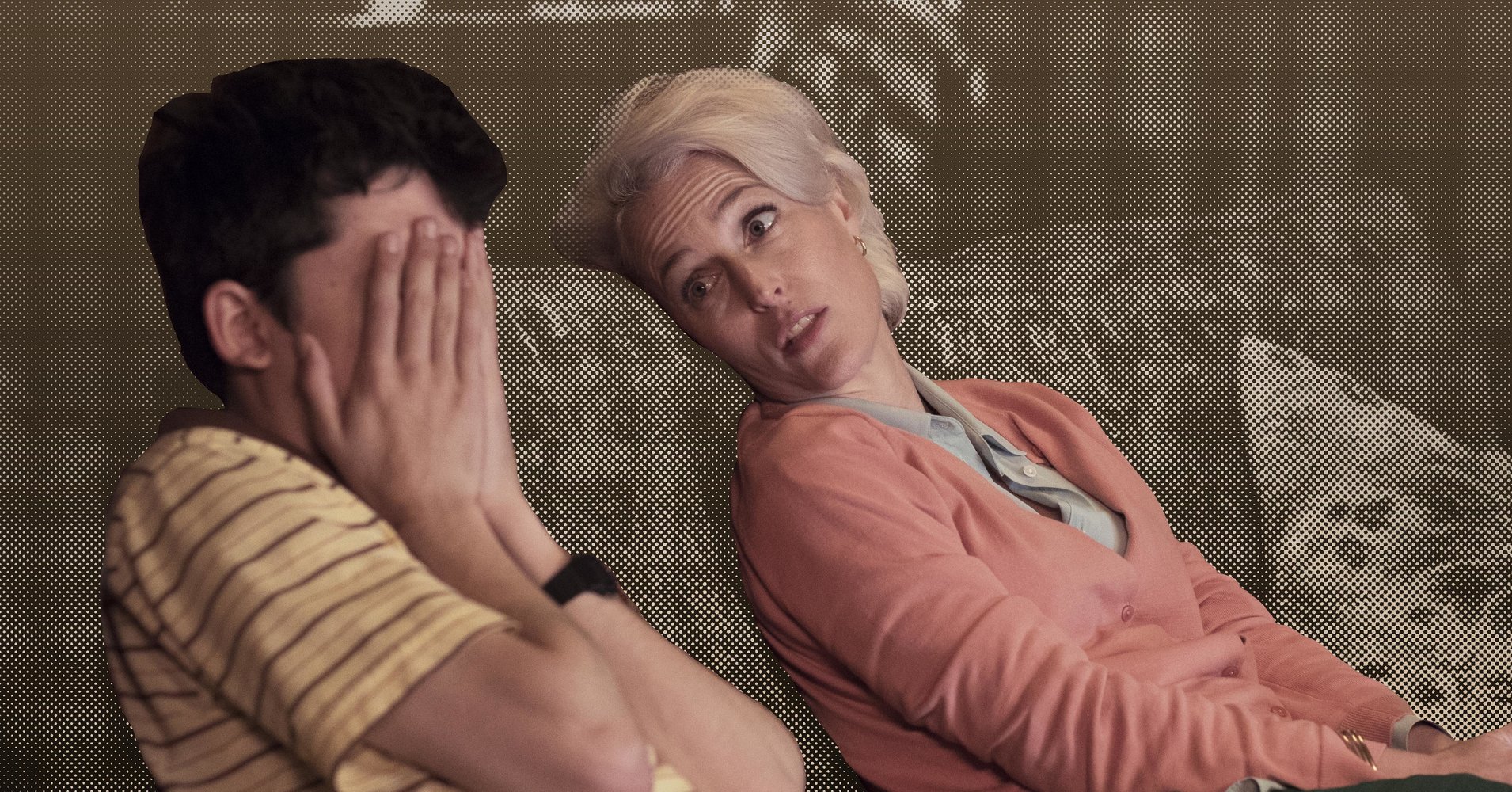[ad_1]
In an unmistakably teenage bedroom, complete with red mood lighting and a glittery lava lamp, a high schooler named Tanya is furiously humping her girlfriend Ruthie.
“How’s that? Is that good for you?” Tanya (played by actress Alice Hewkin) asks.
“Not really, you’re dry-humping my leg,” a stoic Ruthie (Lily Newmark) responds. They switch positions.
“What about this?” Tanya asks in a bucking spread eagle, peering up with wide eyes and high hopes. Ruthie, on top now, looks dead inside. “Ow, leg cramp,” she moans, pushing Tanya away and dismounting.
The opening scene of “Sex Education” Episode 4, like so many scenes in Netflix’s new show about unfiltered teenage horniness, is equal parts raunchy, cloddish and sexy; a feat of NSFW choreography when you think about it. The feverish grinding and the deliberately gawky cross-body exchanges unravel like near-perfect facsimiles of cumbersome teenage attempts at sex ― which is to say, they don’t look choreographed at all.
Unlike the teenage shows of network and cable TV, “Sex Education” and its streaming brethren (“Elite,” even the animated “Big Mouth”) are giving teenage and adult audiences something rare: a glimpse of what messy, sticky masturbation and aspirational sex between two consenting near-virgins actually looks like.
To do so, Netflix relies on a crew of writers, directors and producers who’ve brought a keen sense of fluid, inclusive teenage sexuality to a series about a 16-year-old son of a sex therapist, Otis (Asa Butterfield), and his enterprising friend Maeve (Emma Mackey). Together they team up to give sex advice to their perpetually inflamed cohort at Moordale Secondary School. (Ncuti Gatwa and Gillian Anderson round out the show’s stellar leading cast.)
But scenes like the one between Hewkin and Newmark unravel seamlessly, thanks particularly to the show’s intimacy coordinator Ita O’Brien, who works with the actors before, during and after their sex scenes to ensure that standards of safety are met and that the delightfully complicated choreography is performed efficiently.
O’Brien’s method for choreographing raunchy sex scenes between high-school-age characters is based off the work of the Royal Central School of Speech and Drama’s Vanessa Ewan, who requires her actors to watch animals mating to understand the different rhythms of intercourse. Animal mating rituals became a key part of the intimacy workshop O’Brien conducted with the “Sex Education” cast and crew prior to filming.
“Using animal mating processes can help actors be detailed and precise about their movements during an intimacy scene, without having to reveal anything about their own personal habits of physical expression,” O’Brien told HuffPost in a phone conversation. She screened videos of gorillas, dogs, snails, cats and horses as sexual inspiration, which is meant to help direct actors’ movements without invoking their own personal sexual habits and proclivities. “What I’m looking for is a shared language that keeps it professional.”
For the riotous humping scene referenced above, Tanya, eager to please her partner, was in what O’Brien described as full-on bonobo mode.
Ruthie, on the other hand, was channeling an elephant seal. “That feeling of weight and blubber,” as O’Brien put it.

“I had to [give] feedback after each animal orgasm exercise,” Kate Herron, who directed four episodes of the show, told HuffPost. “‘Yes when you did that final big shudder as the seal climaxing it was magical’ was not something I thought I would be saying to an actor.”
Channeling the animal kingdom is but one of the techniques O’Brien employs toward the ultimate goal of creating sex scenes that are safe and consensual processes for the actors. She works like a stunt director or dance choreographer, meticulously plotting out each beat of a sex scene ahead of time and remaining on set to provide support for the individuals acting them out.
“When a fight director comes on to a set, they are given time and space to choreograph every detail of the fight,” O’Brien explained. “And intimacy scenes should work the same way.”
O’Brien worked as a dancer, actor and movement teacher before landing her current vocation. In 2009, while directing a play featuring sexual abuse on stage, she began thinking of clear-cut processes to ensure her actors’ safety and comfort. Taking inspiration from women like movement coach Meredith Dufton and Jennifer Ward-Lealand, the president of New Zealand Equity, she developed a program centered around communication and consent.
After Harvey Weinstein’s decades-old history of sexual misconduct finally surfaced in October 2017, the entertainment industry was suddenly hungry for what O’Brien had long been practicing. A “Sex Education” producer heard one of her interviews on BBC Radio’s “Front Row” and decided to reach out.
‘Yes when you did that final big shudder as the seal climaxing it was magical’ was not something I thought I would be saying to an actor.
-“Sex Education” director Kate Herron
“Sex Education” is a delightfully sex-positive British teen dramedy that revolves primarily, but not entirely, around Otis. Though his mom’s influence has crippled his own burgeoning physicality (he finds it impossible to jack off on his own), Otis is supremely gifted at solving the sexual Rubik’s cubes of his peers, a diverse student body whose sexuality is treated as awkward and sloppy, but also serious and pleasurable and vulnerable.
Though the actors in “Sex Education” aren’t actually teenagers, they’re young. Some were quite inexperienced performing intimate scenes when they arrived on the job. So, the first step of O’Brien’s pre-filming process was an intimacy workshop, during which members of the cast and crew openly shared their past experiences miming sex on screen. Some recalled feeling confused, surprised, uncomfortable, taken advantage of and even harassed on former gigs. That’s where the animal mating rituals came in.
The various videos helped the cast learn ways to describe and understand sexual physicality in a manner that wasn’t “personal or embarrassing.”
“We can ask, ‘OK, what rhythms might this character use here?’” O’Brien explained. “Are they quick, slow, direct or indirect? What type of progression might we see? Maybe we start with a slug and then turn into a gorilla and finish off with the bonobo.”

Once on set, O’Brien talks actors through the scenes, specifying where they do and don’t want to be touched. “You choreograph it exactly like a dance,” O’Brien said. “First there’s the physical structure, without any emotion, saying it in words. So, it would be one thrust, two thrust, three thrusts, through to orgasm. There is no question about something happening during filming outside what is expected.”
She looks to literature and film for inspiration, too, but never porn. “The Kama Sutra has been really helpful,” she added. “I’ve absolutely choreographed by going Number 44, followed by 99, followed by 60.”
The actors and their intimacy coordinator practice, over and over, until the choreographed actions become routine. “Rehearsing makes it a more normal thing.” Even minor characters and background appearances chart their intimate scenes in this way. If two blurry people are making out against a locker in the distance of a shot, those actors know exactly what they’re doing.
The more intimate scenes are always filmed on a closed set, however, so only those people absolutely critical to its execution are present. Additionally, O’Brien always advocates for gender parity in crew positions, especially during scenes about female sexuality. The guidelines during these scenes are simple: genitals should never touch. Men and women wear flesh colored g-strings or pants to prevent actual contact, and are sometimes separated by flesh-colored cushions or sheets. When kissing, both parties must agree that they’re comfortable using tongue.
One potential, but perhaps expected, workplace hazard: erections. “It’s not suitable to be in the workplace with an erection,” she said. “So, if an actor is feeling overwhelmed in the middle of an intimate scene, he is able to halt the action and take a time out. It’s natural and normal, when a body is moving against another body, for an erection to happen. But it’s not acceptable for the workplace and you need to take time away.”

With her soothing voice and forthright manner of speaking about topics that are often cloaked in shame and innuendo, O’Brien is reminiscent of Anderson’s character in the show, the savvy sex therapist. And like Anderson’s fictional character, O’Brien has growing kids of her own (18 and 21) who are often flummoxed by her occupation.
“They are incredulous when they come home and my researching means I am reading The Whole Lesbian Sex Book: A Passionate Guide for All of Us by Felice Newman!”
As a mother and sexpert, O’Brien seems preternaturally suited for the difficult task of creating a show about teens having (lots of) sex that doesn’t feel leering or pervy. Instead, the show is itself an educational experience, a kind that most Americans never received outside of the pornography they ogled as kids. “Sex Education” presents sex as something that need not be romanticized or censored, but something that just is.
Of course, teens aren’t the only ones who feel insecure at the thought of sex stuff. O’Brien said her work as an intimacy coordinator has helped her become far more fluent in the sexual matters of her own personal life, and emboldened her to speak up on topics that she once found humiliating or taboo. Though there is a firm line between intimacy in art and life, O’Brien believes the lessons she teaches on set translate to the world beyond it.
“Agreement and consent, saying where are you happy to be touched and where you’re not. I think that’s a really empowering thing,” she said. “One thing I’ve noticed is how often, in my line of work, people say ‘I don’t know.’”
[ad_2]
Source link

